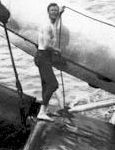Did you know that Charles Lindbergh, the biggest media star of the 1930’s, went to China? Well, I didn’t. He was there in 1931, after he had become the Lone Eagle, and thus famous, and before the kidnapping and his more public decent into crypto-fascism. He never seems to have liked fame much, and this is right at the point where he was perhaps finding out how unpleasant it could be, although it was about to get a lot worse.
He was in China because he was pioneering the Great Circle route to Asia in his floatplane. Unlike the people who become famous and then sit around at banquets talking about it, he remaied an aviation pioneer.
I have not yet read his wife’s book on the trip, but I suspect that one of the reasons he used a floatplane was that he was flying into places where you could not count on such mod cons as a working airfield, and might have to make do with an open body of water. In fact, when he arrived in Nanjing there were so many boats waiting to greet him on the river that he was forced to divert into the “Lotus Lake” which might be Xunwu Lake. Once in China he continued he pioneering work, offering to conduct an aerial survey of the areas hit by the Yangzi flood of 1931. You can see some of his pictures here. Here is more on the flood, from an excellent site on the floods and the rebuilding.
The thing that brought this to my attention was his crash in China. Here he is after tipping his plane in the Yangzi river.
I love this picture. I suppose the Colonel could have just let someone else dive in and attach cables to his plane, but looking at him I suspect he was happy to be doing it. When he arrived in China he skipped the welcoming banquet that had been planned for him to get right back in the air and begin surveying flood damage. I have not been to a lot of banquets held in my honor, but I can imagine they would get old pretty quick. Getting back to flying and fixing airplanes must have been nice. Sadly, even barefoot and in a t-shirt his fame followed him. When he was taking off, every crew member of HMS Hermes who owned a camera was waiting to take a picture of him, and there were plenty of shots of the recovery, if not the crash. This, of course, was media gold. Hallett Abend, one of the Old China Hand reporters, relates that the commander of the Hermes confiscated the pictures and offered to sell them to the press, with the proceeds supposedly going to fund a hospital bed, although that seems not to have happened. Abend ended up paying $US 5,000 for the pictures, which is about $78,000 in today’s money. Not a lot compared to what you could get today for pics of Tiger Woods wrecking his car, but still a good example of how modern media culture can track you anywhere. Assuming, of course, that you are worth tracking. Nowadays global media culture is a bit quicker – Abend sent his negatives both by air across the Pacific and by train through Siberia. The event happened on Oct. 2, and the pictures did not make the Times until Oct 29, but the basic idea is the same.
Getting up in the air and getting away from it all must have seemed nice, but the trip also showed Lindy how limited that could be. He could fly over the floods, and was actually helpful in showing that they were bigger than anyone thought, but he wanted to actually help, i.e. return to earth and actually do something. He landed a few times, but at least once, the result was almost disastrous. He and J. Heng Liu, head of China’s public health administration landed at “Hinghwa” in Jiangbei and were besieged and almost sunk by refugees in need not of their cargo of medicine, (which an airplane might carry in useful amounts) but of food. His wife related the story in a radio address carried by the New York Times Feb. 22, 1932. If you want a nice quote on the limits of technology and the inability of the First World to fix the Third, this is it.
“We’re going to start the engine,” shouted out the doctor in Chinese. “If you don’t get back, you’ll all be killed.”
An old woman sat immovable in the front row of boats. “What does it matter?” she asked sullenly, “we have nothing.”
But with the first few explosions of the engine the crowd backed away. the big plane pushed out slowly, trailing a tail of boats until at last it took off straight ahead, regardless of wind-direction-straight ahead over fences and tree-tops and collapsed roofs, anything to get away. Now they were free, high above the black swarm of sampans.
I do not know how those people felt when they saw a last hope disappear into the sky or what those other millions felt who saw us fly over their desolate country. I know, though, that I had a kind of horror that I should be so near to them and have the power of escaping so easily from their misery.
